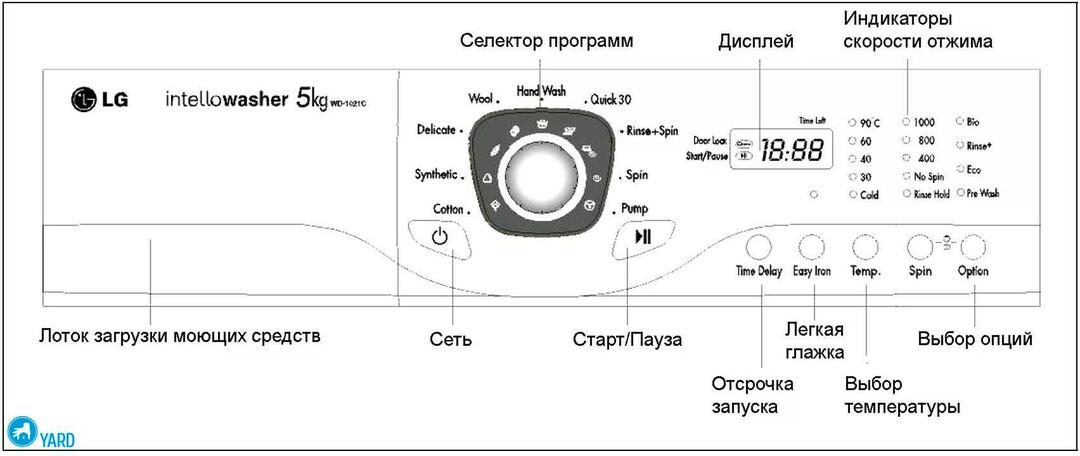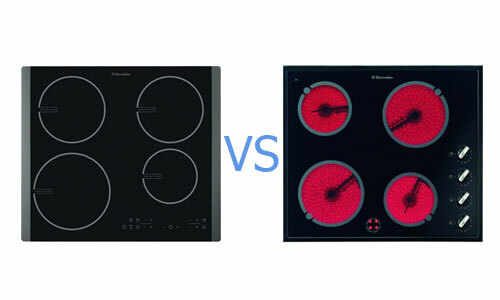If you strive for keeping your car in a brand-new clean appearance, you have a good reason to invest in a pressure washer. It's available in a wide range on the market, that's why picking the right product can be a hard task. Keep on reading this guide and you’ll get to know about TOP best pressure washers for cars and main pros and cons of their application.
CONTENT
- 1 Gas vs Electric pressure washer
- 2 TOP-6 Most popular electric and gas-powered pressure washers
- 3 10 Best Pressure Washer for Cars Comparison Table
- 4 How to Clean Your Car with a Pressure Washer
- 5 FAQ
Gas vs Electric pressure washer
There are two types of pressure washers which are commonly used and preferred by the users. Let’s consider their pros and cons.
Electric pressure washers
Electric pressure washers are probably the most common type of pressure washers used at someone's home. They are really convenient to use and generally pretty lightweight. The average electric pressure washer will cost a little less than a gas-powered unit. Nevertheless, with a comparatively low price, some models can be very powerful. Some electric pressure washers are up to 2000 PSI and still remain quiet. This pressure is high enough for car washing or small items like bikes, driveways, backyard grills, patio, or pool area, as in general, the pressure range of 1200-2000 PSI is needed for car cleaning.
Nevertheless, these pressure washers are limited in their power output by the electrical outlet they are getting the energy from. Besides, you’ll have to run an extension cord out to your barn or some other part of your property that might not have such electrical outlet and that could be quite messy for you. As you know already, these are lower price machines and according to some reviews, lower quality ones, as well.
Gas-powered pressure washers
If you are seeking a powerful pressure washer to use for important work, then you will likely want to purchase a gas-powered pressure washer. These washers are much more portable than their electric counterparts. Gas-powered units are free from any cords so you can easily transfer your property and use it wherever you want. So if you are a ride-on-trail amateur who eagers to drive your four-wheeler through the rutted mud you will have to deal with heavy-duty cleaning after. And here you and your four-wheeler will be saved by gas pressure washer with its 3000 PSI, required for such work.
The problems with gas-powered pressure washers are in the higher level of noise and fumes. All gas-powered machines emit noxious fumes so you won’t be able to use them indoors. Another flipside is that in most cases, you will pay more for a gas-powered pressure washer. This combined with the fact you’ll have to buy detergents, gas, oil, and other spares. Besides these pressure washers do require you to perform maintenance on it. However, if you keep up with the routine maintenance, they may last you for many years.
Thus, summarizing all the above-mentioned pros and cons of the electric and gas pressure washers, the following conclusion can be made: If you are going to clean your car 1-2 times per week or deal with light-duty works like keeping the area around your home clean, you will most likely enjoy having an electric powered pressure washer within easy reach. But if you have to face heavy-duty work on a constant basis, requiring a lot of pressure washing power, and have no access to the mains, you may want to go with a gas-powered machine.
TOP-6 Most popular electric and gas-powered pressure washers
I have decided to grab some of the most popular units of these types within the price range from $ 150 to $ 1000, and give them a test run.
1. Karcher K5 Premium Electric Power Pressure Washer
Versatile and high pressure, the Karcher K5 Premium Electric Power Pressure Washer is a high performance, powerful Karcher pressure washer that offers efficient cleaning and a long lifespan. This is a great option for larger cleaning projects that require a high-pressure hose.
Features
- Pressure (PSI): 2000
- Flow rate (GPM): 1.4
- Weight w / o accessories (lbs): 28.7
- Dimensions (L x W x H) (in): 16.46 x 16.77 x 34.33
- Hose length (ft): 25
Pros & Cons
Pros:
| Cons:
|
There are many things to love about Karcher K5 Premium. It delivers enough power to spray-clean any outdoor object free of dirt and debris. It comes with a wide range of features that make the tool easy and enjoyable to use. Except for the problems with the plastic wheels and delicate hose connector, the K5 Premium is, in my opinion, worth to be purchased for your in-house needs.
Karcher K5 Premium: Check the current price
2. Powerhouse International Electric High Power - Pressure Washer
This is an extremely powerful and efficient electric operated pressure washer at a great price. It is equipped with the Total Stop System (TSS) trigger gun which has a trigger safety switch and a brush motor shuts off automatically when the trigger is released. This helps to prolong the motor's life. The best part is that it comes with self-storing accessories which will help to keep it organized. Together with the model, you will get 5 quick-connect nozzles (0 °, 15 °, 25 °, 40 °, and soap), a universal spray gun that can be extended, a foam sprayer, and a pair of specialized brushes (rotating brush for patios and a soft-bristle brush).
Features
- Pressure (PSI): 3200
- Flow rate (GPM): 2.2
- Weight (lbs): 32
- Dimensions (L x W x H) (in): 15 x 18 x 24
- Hose length (ft): 30
Pros & Cons
Pros:
| Cons:
|
This Powerhouse pressure washer model lives up to its name, both with performance and with its looks. It is compact, versatile, powerful and easy to use. I would recommend this washer for those who deal with heavy-duty cleaning on a constant basis. A unit like this will help you wash away and clean all types of stains and filth with ease, what you need is just a power outlet available. If the Powerhouse model fits your budget it is definitely worth a closer look.
Powerhouse International: Check the current price
3. Briggs & Stratton 20680 Electric Pressure Washer
This model is designed to be both stationary and portable with its wide body and 2 large wheels with a size of 7 inches. The frame is pretty solid as it is made of durable welded steel. Nevertheless, the machine is pretty lightweight, which makes it very easy to handle. The pressure hose is 20 feet long and it is very flexible. It comes with interchangeable nozzles that connect very easily. The motor of this pressure washer model can operate in several modes, with 900 PSI minimum and 1800 PSI maximum pressure, exerting at 1.2 GPM. Yards, cars, garages, patios and a whole lot more can be cleaned with this pressure.
Features
- Pressure Max (PSI): 1800
- Flow rate (GPM): 1.2
- Weight (lbs): 31.5
- Dimensions (L x W x H) (in): 15.5 x 18.8 x 35
- Hose length (ft): 20
Pros & Cons
Pros:
| Cons:
|
In my opinion, with a commercial design, this pressure washer is ideal for a wide variety of small jobs around the house. It's within an acceptable price for the available capabilities and specifications. But if you need to deal with heavy-duty application you may want to get something beefier.
Briggs & Stratton 20680: Check the current price
4. Karcher G3500 OHT Gas Pressure Washer
Driven by a powerful Honda GX200 engine, the G 3500 OHT is the perfect work companion for demanding users. Equipped with a three-piston crankshaft (triplex) pump with the professional-grade unloader valve, this unit can handle the largest and most challenging cleaning assignments. Includes the patent-pending VersaGRIP ™ spray gun. Quick Connect for easy setup and storage. You should pay attention that there’s warning information from the manufacturer that this product can expose you to chemicals that are included in the latest Prop 65 warning, lead and Diisononyl phthalate, which are known to the State of California to cause cancer and reproductive harm.
Features
- Pressure (PSI): 3500
- Engine type: Honda GX 200
- Flow rate (GPM): 2.6
- Weight w / o accessories (lbs): 76
- Dimensions (L x W x H) (in): 24 x 20 x 23
- Hose length (ft): 25
Pros & Cons
Pros:
| Cons:
|
To my mind this unit can be used for industrial purposes. It is an extra powerful model, equipped with a not less powerful and reliable motor for heavy-duty machinery cleaning. That’s why you should carefully think over your cleaning targets at your household, considering its high price, whether you need such powerful assistant to achieve them or not.
Karcher G3500: Check the current price
5. Generac SpeedWash 7122 Gas Powered Pressure Washer
This model is specifically designed for powerful and faster cleaning - the manufacturer claims that this product can clean up to 50% faster than other cleaning units in the same range. Also, this gas unit comes with plenty of handy attachments like power broom which allows performing multi-tasks. It’s clear that Generac intended this product to be easy to use, and they did it with all the additional features like quick-change nozzles, for example. This unit is very durable and comes with a kink resistant high-pressure hose.
Features
- Pressure (PSI): 3200
- Engine type: Generac 196cc OHV
- Flow rate (GPM): 2.7
- Weight (lbs): 62
- Dimensions (L x W x H) (in): 24.2 x 18.9 x 35.5
- Hose length (ft): 30
Pros & Cons
Pros:
| Cons:
|
The SpeedWash 7122 is an amazing pressure washer that comes with some of the best and easy-to-control attachments. Overall, if you’re looking for a gas pressure washer, the Generac SpeedWash 7122 is definitely worth considering. I believe that this model stands out with the best title in its category!
Generac SpeedWash: Check the current price
6. Briggs & Stratton 20545
Briggs and Stratton 20505 Gas Pressure Washer is slightly more powerful than most electric models, but this is more than sufficient for most domestic cleaning options, no matter the size or intensity of the project. It has an upright cart design for easy mobility in any outdoor environment. Its large wheels are designed to eliminate the risk of punctures or tire deflation.
The integrated detergent injection system allows you to add the cleaning solution of your choice to the water. Quick Connect Spray Tips allows switching quickly and easily between two high-pressure pre-defined spray patterns from pin-point to wide (0 and 25 degrees) for precise
Features
- Pressure Max (PSI): 2200
- Engine type: 550e Series OHV
- Flow rate (GPM): 1.9
- Weight (lbs): 50
- Dimensions (L x W x H) (in): 28 x 22 x 50
- Hose length (ft): 25
Pros & Cons
Pros:
| Cons:
|
Briggs & Stratton 20545 is one of the lightest gas pressure washers on the market, but it is also one of the most affordable. However, it is designed for durability. The Briggs and Stratton 20545 1 Washer is a long-lasting gas pressure washer that will help you to keep your outdoor spaces and equipment clean for years, even if used regularly and heavily. It will be useful for cleaning different types of patios, driveways and other elements of houses. I would define it as a great pressure washer for beginners.
Briggs & Stratton 20545: Check the current price
10 Best Pressure Washer for Cars Comparison Table
1
Karcher

Karcher K5 Premium Electric Power Pressure Washer, 2000 PSI, 1.4 GPM
2
Powerhouse International
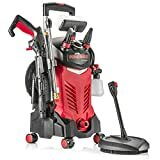
Powerhouse International - Electric High Power- Pressure Washer - 3000 PSI 2.2 GPM - Power Washer - Patio Cleaner - Hose Reel - Spray Gun (Red - Platinum Edition)
3
Briggs & Stratton
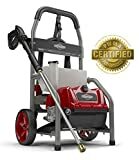
Briggs & Stratton 20680 Electric Pressure Washer 1800 PSI 1.2 GPM with 20-Foot High Pressure Hose, Turbo Nozzle & Detergent Tank
4
Karcher
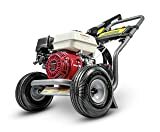
Karcher G3500 OHT Gas Pressure Washer with VersaGRIP, Powered by Honda, 3500 PSI, 2.6GPM
5
Generac
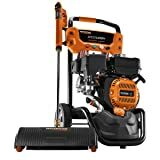
Generac SpeedWash 7122 3200 PSI 2.7 GPM 196cc Gas Powered Pressure Washer System with Attachments
6
Briggs & Stratton
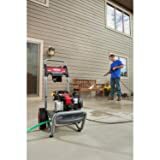
Briggs & Stratton 20545 2200Psi 1.9Gpm Vs Washer, Red
7
GreenWorks
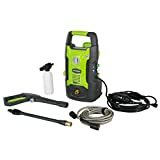
Greenworks 1600 PSI 13 Amp 1.2 GPM Pressure Washer GPW1602
8
Stanley
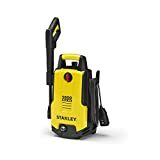
Stanley SHP1600 Electric Power Washer, 1600 PSI, Yellow
9
Suyncll
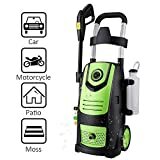
Suyncll High Power Washer Electric Pressure Washer, 3800PSI 2.8GPM Pressure Washer Car Patio Garden Yard Cleaner (Green)
10
Stanley
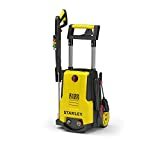
Stanley SHP2150 Electric Pressure Washer with Spray Gun, Quick Connect Nozzles Foam Cannon, 25 'Hose, Max PSI 2150, 1.4 GPM
How to Clean Your Car with a Pressure Washer
There's nothing like the look of a thoroughly-cleaned car. Such effect can be fastly and efficiently reached by using a pressure washer. Although it seems to be simple enough in application, there are still some issues to consider before you roll up your sleeves and start washing.
Stage 1: Determine power parameters
Choosing type and pressure of a washer needed
The first decision you’ll have to make is whether to buy a gas or electric pressure washer. Electric is the better option because gas units are too powerful for car washing. In this regard, you should know the basics like pressure level (PSI or pounds per square inch) and water flow (GPM or gallons per minute). Note that while higher PSI provides deeper cleaning, higher GPM means quicker cleaning time and rinsing of difficult-to-reach surfaces. Multiply the PSI times the GPM to get the Cleaning units. The latter represents the overall efficiency of the cleaning process. Also, mind that max PSI is the limit value when the machine stops running after exceeding it, you should always stick to operating pressure. Thus, always select a pressure washer with settings of 1200-2000 PSI and a 1.4-2.0 GPM. This will make it safe to use the unit on your car without worrying about damaging the paint.
Choosing the appropriate nozzles
Some pressure washers come with a single variable pressure spray nozzle that you can twist to adjust between 0 to 60-degree spray patterns. Most come with 4 to 5 color-coded nozzles that you must change manually between jobs.
Your nozzles are the most important accessory when determining how much cleaning power you need for specific jobs. These are generally color coded from strongest to lowest pressure:
- Red (0 degree) - Removing tough stains or debris (caked on mud, dried gum or sap, rust) from very small areas on concrete or metal. Not good for cars.
- Yellow (15 degrees) - Surface prep to remove dirt, mildew, or paint before painting or re-sealing. It can remove tough grime from a safe distance on hard surfaces.
- Green (25 degrees) - Most common for home use. Good for cars, boats, lawn furniture, driveways, and decks. Good for pre-wash rinse.
- White (40 degrees) - Gentler, wider spray. Ideal for the surface of cars. Good for rinsing-off detergent.
- Black (low-pressure soap nozzle) - Low pressure for applying soap.
Stage 2: Mind safety precautions
Read the manual - It will tell you exactly how to operate your machine, plus it will include information about water supply required, replacement parts, customer service, warranties, and troubleshooting tips.
Wear protective equipment. It is advisable to use safety goggles, work gloves, proper shoes, ear protection (especially with gas power washers), and pants.
Prep your surroundings. Cover exterior lights and vents, and close the windows. Get all potential tripping hazards out of the way.
Hands off. It's one of the crucial safety rules! Never get your hands or any other part of you in the way of the pressure washer spray. Don’t spray it at anyone else, either. Never let children use a pressure washer unless they’re older teens that understand the risks.
No ladders! Pressure washers can produce a serious kickback force, which can lead to a fall.
Stage 3: Pre-wash rinse
Start with a pre-wash rinse to remove the top layer of mud or other debris stuck to the surface. Attach a 25-degree tip to the nozzle for pre-wash rinsing. It's important to note that the initial flow of water that comes through the pressure washer may be too strong for your car. I recommend pointing the nozzle at the ground first to avoid directing initial flow at your car.
Stage 4: Apply detergent
You should remember - never use any other detergent than that approved for use with your pressure washer.
The following 3 steps of applying pressure-wash detergents:
- Follow the instructions of a detergent manufacturer to prepare the cleaning solution.
- Fill the detergent tank of the pressure washer with the diluted detergent. Be sure to switch the setting on the pressure washer so you will be spraying detergent rather than water onto the car. If there is no detergent tank, apply the detergent by hand with a cloth.
- Spray the detergent onto your car. Start from the top of the car and work your way down. Hold the detergent for a couple of minutes, but don’t let it dry. To remove stubborn dirt and grease, use an attachable car brush.
Stage 5: Final rinse
When you're ready to rinse off the detergent, switch the setting back to water and rinse the car with the 40-degree tip. Finally, spray down the wheels and dry your vehicle.
FAQ
Is it safe to use a power washer on a car?
Pressure washing is worth to be practiced if done right, but there are a few things you must keep in mind to prevent any damage. You should consider the following factors like:
- Pressure, for car washing, as long as you stay somewhere between 1200 to 2000 PSI your vehicle should be fine
- Right Pressure Washer Nozzle type depending on a stage of car washing
- When it comes to pressure washers, you’ve got both gas and electric options to choose from. Both of which will do the job, but electric probably being your best choice. Gas-powered pressure washers produce around twice the maximum pressure (up to 5,000 PSI).
Can I pressure wash my car engine?
Yes, you can, but it's not advisable. Pressure washing is a quick and easy option, however, the risks of damage to electrics are quite high. You have to be sure no water gets into, water and electrics are bad, water in the engine itself is even worse. It really will get into every little gap and hole.
Take your time and wipe round with a damp cloth, remove any debris and leaves and use degreaser in areas where you may have had a leak or spilled any oil.
I would advise leaving the pressure washer just for the exterior of your car. Otherwise, you should address to the professionals.
Can I wash a hot engine?
No, you can’t. Be sure that you can at least put a hand on it without burning yourself. Warm is fine, but not right after it has been driven. Cold water on a hot block or exhaust manifold can cause the parts to crack.
Is hot water bad for car paint?
Yes, hot water washes off the protective wax and the overcoat for the paint thus leaving your car paint unprotected and exposed to increased corrosion and abrasiveness. It's OK if it's bearable for you while touching it with your hand.
How often should I wash my car?
It depends on the region you live in. For instance, if you live in an area with a lot of salt - either from a nearby ocean or from salt trucks on the winter roads - you probably should wash it more, as salt can corrode the metal and cause rust. Those who spend a lot of time driving through the backcountry should give their car a little more care, as well.
Overall, it isn't something you have to do very often. A simple wash every two weeks, a wax at least every six months and a basic interior clean-out every few months should keep your car in a proper condition.

